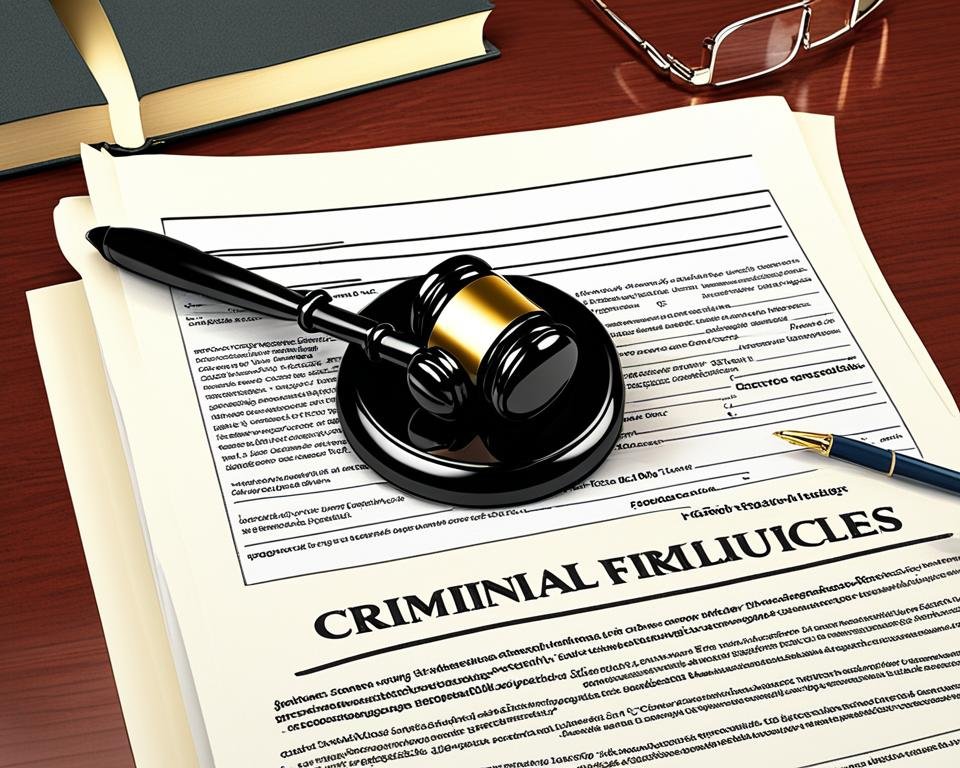As an expert in criminal law, I understand the importance of knowing your rights in criminal cases. Navigating the complex and intimidating criminal justice system can be overwhelming, but having a solid understanding of your rights is crucial to protect yourself and make informed decisions throughout the process.
In this comprehensive guide, I will provide you with valuable insights and information to help you navigate the legal landscape of criminal cases. From understanding the basics of criminal law and procedure to knowing when and how to invoke your rights, I will cover a wide range of topics to empower you to confidently assert your rights.
Whether you are facing criminal charges or seeking to support a loved one through the legal process, this guide will serve as your invaluable resource. Together, we will explore the significance of legal representation, the impact of evidence in your defense, and strategies to protect your rights during police interrogations.
Join me on this journey through the criminal justice system as we uncover the tools and knowledge you need to assert your rights effectively.
Key Takeaways:
- Understanding your legal rights is crucial in criminal cases.
- Legal representation plays an important role in protecting your rights.
- Exercising your right to remain silent can prevent self-incrimination.
- Navigating the criminal justice system requires knowledge and confidence.
- Effective defense strategies can make a significant difference in your case.
Understanding Your Legal Rights in Criminal Cases
In order to navigate the complex world of criminal cases, it is crucial to have a solid understanding of your legal rights. This section will delve into the basics of criminal law and procedure, provide guidance on when and how to invoke your rights, and emphasize the importance of having legal representation. Let’s explore these key aspects of understanding your legal rights in criminal cases.
The Basics of Criminal Law and Procedure
Before delving into the specifics of your legal rights, it’s important to grasp the fundamental principles of criminal law and procedure. Criminal law sets out the rules and regulations that determine what constitutes a crime and establishes the punishment for those who commit offenses. Criminal procedure, on the other hand, outlines the processes and steps involved in the investigation, arrest, trial, and sentencing of individuals accused of crimes.
In the United States, criminal law is primarily governed by state and federal statutes, as well as constitutional principles. These laws outline the elements of various offenses, establish defenses that individuals may raise, and set the standard of proof required for conviction. Understanding the basics of criminal law will provide you with a foundation for effectively asserting your rights throughout the criminal justice process.
When and How to Invoke Your Rights
Knowing when and how to invoke your rights is crucial for safeguarding your interests in a criminal case. The most common rights that individuals have in criminal cases include the right to remain silent, the right to have an attorney present during police questioning, and the right to a fair trial. These rights are enshrined in the United States Constitution and are designed to protect individuals from self-incrimination and ensure due process.
When interacting with law enforcement officials, it is important to be aware of these rights and exercise them appropriately. For example, invoking your right to remain silent can prevent statements made under pressure from being used against you in court. Similarly, having legal representation present during police questioning can help protect your interests and ensure that your rights are respected.
The Importance of Legal Representation
Having legal representation is essential when facing criminal charges. A skilled criminal defense attorney will have a deep understanding of the law, the criminal justice system, and the strategies needed to build a strong defense. They will be able to guide you through the complexities of your case, advocate for your rights, and ensure that you receive a fair and just outcome.
Legal representation plays a critical role in every stage of a criminal case, from pretrial negotiations to the trial itself. A competent attorney will conduct a thorough investigation, challenge the admissibility of evidence, question witnesses, and present arguments on your behalf. They will work tirelessly to protect your rights, explore potential legal defenses, and seek the best possible outcome for your case.
In summary, understanding your legal rights in criminal cases is crucial for successfully navigating the criminal justice process. By familiarizing yourself with the basics of criminal law and procedure, knowing when and how to invoke your rights, and securing competent legal representation, you can ensure that your rights are protected and that you have the best possible chance of obtaining a favorable outcome in your case.
Engaging a Criminal Defense Attorney Early On
When facing criminal charges, it is crucial to engage a skilled criminal defense attorney as early as possible. The expertise and guidance of an experienced lawyer can significantly impact the outcome of your case. A defense attorney will navigate the complex legal process, protect your rights, and advocate for your best interests.

The Role of Counsel in Pre-Trial Activities
During the pre-trial phase, a criminal defense attorney plays a vital role in various activities that are critical to building a strong defense. These include:
- Investigation: A skilled attorney will thoroughly investigate the facts surrounding your case, gathering evidence and interviewing witnesses to uncover crucial information.
- Plea negotiations: Your defense attorney will engage in negotiations with the prosecution, seeking favorable plea deals that may result in reduced charges or penalties.
- Evidence collection: Your attorney will work diligently to collect and analyze evidence that supports your defense, ensuring that it is admissible in court.
Selecting the Right Criminal Defense Lawyer for Your Case
Selecting the right criminal defense lawyer is a critical decision that can greatly impact the outcome of your case. Here are some factors to consider when choosing an attorney:
- Experience: Look for an attorney with extensive experience in criminal defense, particularly in cases similar to yours.
- Specialization: Consider whether the attorney specializes in the specific area of criminal law relevant to your case.
- Reputation: Research the attorney’s reputation and track record for success in defending clients.
- Communication: Ensure that the attorney communicates effectively and keeps you informed throughout the legal process.
- Compatibility: Trust and rapport with your attorney are crucial, as you will be working closely together to navigate your case.
By engaging a criminal defense attorney early on and selecting the right lawyer for your case, you are taking proactive steps to protect your rights and mount a strong defense. Remember, time is of the essence when it comes to building a solid defense strategy, so it is crucial to act swiftly and seek professional legal guidance.
The Right to Remain Silent and Avoid Self-Incrimination
In criminal cases, individuals have the right to remain silent, a fundamental legal protection that safeguards against self-incrimination. By invoking this right, individuals can choose not to answer questions posed by law enforcement during interrogations or court proceedings. The right to remain silent is enshrined in the Fifth Amendment of the United States Constitution, which states that no person “shall be compelled in any criminal case to be a witness against himself.”
Exercising the right to remain silent is a crucial strategy for protecting oneself during criminal investigations. By refraining from providing potentially incriminating statements, individuals can avoid compromising their defense and inadvertently providing evidence that may be used against them. It is important to note that remaining silent does not imply guilt; rather, it is a legal safeguard that ensures individuals have the opportunity to consult with legal counsel before deciding whether to speak.
During police interrogations, it is crucial to be aware of this right and carefully exercise it. Law enforcement officers may use a variety of tactics to elicit information, including manipulation, intimidation, or promises of leniency. Therefore, remaining silent allows individuals to avoid making statements that may be misconstrued or misused to build a case against them.
Exercising the right to remain silent is a crucial strategy for protecting oneself during criminal investigations.
Furthermore, the right to remain silent extends beyond police interrogations and also applies in courtrooms. Individuals have the right not to testify as a witness against themselves, reinforcing the principle that the burden of proof lies with the prosecution. It is important to consult an experienced criminal defense attorney who can provide guidance on whether to exercise this right during trial proceedings.
By understanding and utilizing the right to remain silent, individuals can navigate the complexities of the criminal justice system with confidence, ensuring that their legal rights are protected throughout the process.
Navigating the Criminal Justice System with Confidence
In order to navigate the criminal justice system effectively, it is crucial to have a clear understanding of the arrest and booking procedures, as well as strategies for securing bail and pretrial release. By familiarizing yourself with these processes and knowing your rights, you can approach the criminal justice system with confidence and make informed decisions throughout your case.
Understanding Arrest and Booking Procedures
When an individual is suspected of committing a crime, law enforcement authorities may initiate an arrest. This process involves taking the person into custody and formally charging them with the alleged offense. Understanding the steps involved in an arrest and booking can help demystify the process and ensure that your rights are protected.
During an arrest, law enforcement officers have the authority to take you into custody, and you may be handcuffed or restrained for safety reasons. It’s important to remain calm and comply with the officers’ instructions while also asserting your rights, such as the right to remain silent and the right to legal representation.
Once you have been arrested, you will be transported to a law enforcement facility for booking. The booking process involves recording your personal information, taking fingerprints and photographs, and conducting a background check. This information will be used to create an official record of your arrest and initiate further legal proceedings.
It is crucial to remember that the arrest and booking procedures are just the initial stages of the criminal justice process. It is during these early stages that you should seek legal representation to guide you through the subsequent steps and protect your rights.
Strategizing Bail and Pretrial Release
After being arrested, you may have the opportunity to secure your release from custody while awaiting trial. This can be achieved through the payment of bail or by pursuing alternative forms of pretrial release. Understanding the strategies involved in securing bail and pretrial release can significantly impact your ability to navigate the criminal justice system effectively.
Bail is a financial arrangement that allows an individual to be released from custody in exchange for a specified amount of money. The purpose of bail is to ensure that the accused will return for future court appearances. The amount of bail is determined based on various factors, including the severity of the alleged offense, the individual’s criminal history, and their ties to the community.
If you are unable to afford the full bail amount, you may have the option to work with a bail bondsman who can provide the necessary funds for a fee. However, it is important to carefully consider the terms of a bail bond agreement and understand the potential consequences of non-compliance.
Alternatively, you may pursue pretrial release options that do not require the payment of bail. These may include personal recognizance, where you are released based on your promise to appear in court, or supervised release programs that involve regular check-ins with a probation officer.
Strategizing bail and pretrial release requires a thorough understanding of the available options and the potential implications of each choice. By working closely with your defense attorney, you can develop a plan that best suits your individual circumstances and maximizes your chances of securing release from custody.

| Benefits of Understanding Arrest and Booking Procedures | Benefits of Strategizing Bail and Pretrial Release |
|---|---|
|
|
Effective Criminal Defense Strategies
In criminal cases, employing effective defense strategies is crucial to protecting your rights and achieving the best possible outcome. By challenging evidence, questioning witnesses, utilizing expert testimony, and exploring potential legal defenses, you can solidify your defense and increase your chances of success.
Challenging Evidence: One effective strategy is to challenge the admissibility or credibility of the prosecution’s evidence. This can include challenging the chain of custody, the reliability of eyewitness testimony, or the legality of search and seizure.
Questioning Witnesses: Another powerful defense strategy is to thoroughly question witnesses. This can involve probing inconsistencies in their statements, uncovering biases or motives, or eliciting testimony that supports your version of events.
Utilizing Expert Testimony: Expert witnesses can provide valuable insights and knowledge in areas that are critical to your defense. Whether it’s a forensic expert, a mental health professional, or a technical expert, their testimony can help challenge the prosecution’s case and strengthen your defense.
Exploring Legal Defenses: Finally, a strong defense strategy involves exploring potential legal defenses that apply to your case. This can include defenses such as self-defense, duress, alibi, or mistaken identity. Understanding the specific elements required for each defense and presenting a compelling argument can be instrumental in securing a favorable outcome.
Protecting Your Rights During Police Interrogations
In criminal cases, it is crucial to understand and protect your rights during police interrogations. Police interrogations can be high-pressure situations where individuals may feel compelled to provide incriminating statements. Knowing your rights and understanding common police strategies can help you navigate these interrogations and safeguard your legal interests.
Knowing Your Rights: Police Strategies
Law enforcement officers are trained to employ various strategies during interrogations to obtain information or elicit confessions. It is important to be aware of these strategies to better protect your rights:
- Good Cop/Bad Cop: Police may use a psychological ploy to create a friendly rapport with one officer while another takes on a more aggressive approach. This tactic aims to exploit emotional vulnerabilities and encourage cooperation.
- Mirroring: Officers may mirror or mimic the behaviors, emotions, and statements of the suspect to establish a connection and build trust. This technique can make individuals feel more comfortable and more likely to disclose information.
- Minimization: Police may downplay the seriousness of the situation or the potential consequences to make the suspect believe that cooperation will lead to a better outcome. This strategy can induce individuals to provide self-incriminating statements.
- Maximization: Conversely, officers may exaggerate the evidence against the suspect, the consequences of non-cooperation, or the likelihood of a conviction. This technique aims to create fear and pressure individuals into confessing or providing information.
Handling Custodial Interrogations
Custodial interrogations, where you are in police custody and not free to leave, require additional caution and awareness. Here are some practical tips for handling custodial interrogations:
- Exercise your right to remain silent: It is crucial to understand that you have the right to remain silent and to avoid self-incrimination. Safeguard your interests by asserting this right and choosing not to answer questions without legal counsel present.
- Request an attorney: If you are taken into custody, it is advisable to request the presence of an attorney before participating in any interrogations. An attorney will not only guide you through the process but also ensure your rights are protected.
- Document everything: Take note of the time, place, and the details of the interrogation. This information can be useful later for your defense attorney and documenting any potential violations of your rights.
- Remain calm and composed: Interrogations can be stressful, but it is essential to stay composed and avoid emotional reactions that may compromise your defense. Remember that everything you say can be used against you.

By understanding your rights during police interrogations and familiarizing yourself with common police strategies, you can better protect yourself and make informed decisions. It is always advisable to consult with an experienced criminal defense attorney who can provide personalized guidance tailored to your specific circumstances.
Understanding the Criminal Justice System From Arrest to Sentencing
When a person is arrested, it marks the beginning of their journey through the criminal justice system. This system is designed to ensure that justice is served by holding individuals accountable for their actions. From the moment of arrest to the final sentencing, there are several key stages that individuals navigate through.
The first stage is the arraignment, where the charges against the individual are formally presented, and they enter a plea of guilty or not guilty. This sets the foundation for the subsequent stages of the criminal proceedings.
Following the arraignment, there may be pretrial motions and hearings, where the defense and prosecution present arguments and evidence to the court. These motions and hearings help the court determine the admissibility of evidence and resolve any legal issues related to the case.
Plea bargaining is another essential stage in the criminal justice system. It is a negotiation process between the prosecution and defense, where the defendant may choose to plead guilty in exchange for a reduced sentence or lesser charges. This stage can significantly impact the outcome of the case.
If plea bargaining does not lead to a resolution, the case may proceed to trial. During the trial process, both the defense and prosecution present their evidence, witnesses, and arguments. A jury or judge then determines the guilt or innocence of the defendant.
Once a verdict is reached, the final stage is sentencing, where the judge imposes the appropriate punishment based on the severity of the crime and other relevant factors. Sentences can range from fines and probation to imprisonment, depending on the circumstances of the case.
Understanding this sequential progression through the criminal justice system is crucial for defendants and their legal representatives. It allows them to navigate the process effectively and make informed decisions at each stage of their case.
“The criminal justice system is complex, but having a clear understanding of its various stages can help defendants protect their rights and advocate for themselves.”
By familiarizing themselves with the arrest to sentencing journey, individuals can better comprehend the procedures, timelines, and potential outcomes of their cases. This knowledge empowers them to actively participate in their defense while ensuring fairness and justice within the criminal justice system.
| Stage | Description |
|---|---|
| Arraignment | Formal presentation of charges and entering a plea |
| Pretrial Motions and Hearings | Arguments and evidence presentation to resolve legal issues |
| Plea Bargaining | Negotiation process for reduced charges or sentence |
| Trial | Presentation of evidence and arguments to determine guilt |
| Sentencing | Judicial imposition of punishment based on the verdict |
By having a comprehensive understanding of the criminal justice system’s stages, individuals can effectively navigate their legal proceedings, ensuring that their rights are protected and receiving a fair and just outcome.
Legal Rights in Criminal Procedure
Pretrial Motions and Hearings
This section explores the legal rights individuals have during pretrial motions and hearings in criminal procedure. Pretrial motions are requests made by the defense or prosecution to the court prior to trial, while hearings provide an opportunity for arguments and evidence to be presented. Understanding and exercising your rights during this stage can significantly impact the outcome of your case.
Plea Bargains and Their Implications
Plea bargains play a crucial role in criminal procedure, allowing defendants to negotiate a guilty plea in exchange for reduced charges or a lighter sentence. This section explores the implications of plea bargains and provides guidance on making informed decisions. It is essential to understand your rights and the potential consequences before entering into a plea agreement.
| Legal Rights in Criminal Procedure | Pretrial Motions and Hearings | Plea Bargains and Their Implications |
|---|---|---|
| Explains the legal rights individuals have during various stages of criminal procedure. | Explores the process of pretrial motions and hearings and the importance of understanding and exercising your rights. | Discusses the role of plea bargains in criminal cases and provides guidance on making informed decisions. |
| Highlights the significance of protecting your rights during pretrial proceedings. | Provides insights into strategies for effective representation during pretrial motions and hearings. | Examines the potential advantages and disadvantages of plea bargains. |
| Empowers individuals with knowledge to navigate the criminal justice system. | Discusses the possible outcomes and implications of pretrial motions and hearings. | Emphasizes the importance of understanding the terms and conditions of a plea agreement. |
| Guides individuals on how to effectively advocate for their rights during pretrial proceedings. | Encourages individuals to consult with their legal representation before making decisions regarding plea bargains. |
The Significance of the Miranda Rights
The Miranda rights hold immense significance in the realm of criminal cases. These rights serve as a crucial safeguard for individuals who find themselves in police custody, ensuring that they are informed of their legal protections during custodial interrogations.
Established by the landmark Supreme Court case Miranda v. Arizona in 1966, these rights aim to protect individuals from self-incrimination and ensure that their statements are voluntary. The court’s ruling mandated that law enforcement officers must inform individuals of their rights to remain silent and to have an attorney present before any questioning begins.
Understanding and exercising the Miranda rights is essential for anyone facing criminal charges. By remaining silent and requesting legal representation, individuals can protect themselves from inadvertently providing self-incriminating evidence. When confronted with police interrogations, it is crucial to assert these rights to prevent potentially harmful consequences.
“You have the right to remain silent. Anything you say can and will be used against you in a court of law. You have the right to an attorney. If you cannot afford an attorney, one will be provided for you.”
The Miranda rights ensure that individuals have the necessary tools to protect their legal rights and ensure a fair legal process. By exercising these rights, individuals can help safeguard their interests and maintain their constitutional protections.
In short, the Miranda rights play a fundamental role in preserving the integrity of the criminal justice system. It is vital for individuals to be aware of their rights, exercise them whenever necessary, and seek legal counsel to navigate the complexities of the legal process.
The Integral Role of Evidence in Criminal Defense
When it comes to criminal defense cases, evidence plays an integral role in shaping the outcome. In order to effectively defend against criminal charges, gathering and analyzing evidence is essential. Additionally, understanding the process of suppressing evidence can be crucial in protecting the rights of the accused.
Gathering and Suppressing Evidence
One of the primary tasks in criminal defense is gathering evidence that supports the defendant’s case. This may include obtaining witness statements, collecting physical evidence, or conducting forensic analysis. The goal is to gather evidence that raises doubt about the defendant’s guilt or challenges the prosecution’s case.
However, it’s important to note that not all evidence is admissible in court. In some instances, the defense may seek to suppress certain evidence that was improperly obtained or violates the defendant’s rights. This process involves filing a motion to suppress evidence and presenting arguments to convince the court that the evidence should be excluded from the case. Successful suppression of evidence can significantly impact the strength of the prosecution’s case.
Evidence Analysis and Its Impact on Your Case
Once evidence is gathered, it must be carefully analyzed to uncover any inconsistencies, weaknesses, or potential alternate explanations. This process involves scrutinizing the credibility and reliability of the evidence, as well as identifying any flaws in its collection or handling.
Evidence analysis can reveal hidden facts, expose questionable procedures, or challenge the conclusions drawn by the prosecution. It allows the defense to present a compelling counter-narrative that casts doubt on the prosecution’s version of events. Presenting a strong evidence analysis can be crucial in creating reasonable doubt in the minds of the judge or jury, potentially leading to a favorable outcome for the defendant.
To illustrate the importance of evidence in criminal defense, consider the following example:
“In a high-profile murder trial, the defense team meticulously gathered and analyzed DNA evidence from the crime scene. Through expert analysis, they discovered that the DNA profile did not match with the defendant, raising doubts about his involvement. This evidence played a crucial role in suppressing the prosecution’s theory of guilt and ultimately led to an acquittal.”
| Evidence | Role |
|---|---|
| Witness Statements | Provide firsthand accounts and testimonies |
| Physical Evidence | Objectively validate or invalidate key elements of the case |
| Forensic Analysis | Uncover scientific evidence and expert opinions |
| Credibility Assessment | Evaluate the reliability and trustworthiness of evidence |
| Motion to Suppress Evidence | Challenge admissibility and protect the defendant’s rights |
Criminal Court Process and Trial Participation
In this section, we will provide a comprehensive overview of the criminal court process and what to expect during trial participation. Understanding the various stages of a criminal case can help individuals navigate the legal system more effectively and make informed decisions about their defense strategies.
Voir Dire: Jury Selection Process
One crucial aspect of a criminal trial is the jury selection process, also known as voir dire. During voir dire, the prosecution and defense attorneys have the opportunity to question potential jurors to determine their suitability and impartiality for the trial. This process ensures that a fair and impartial jury is selected to hear the case.
Attorneys may ask questions related to potential biases, prejudices, or prior knowledge that could affect a juror’s ability to fairly evaluate the evidence presented during the trial. The goal is to select jurors who can objectively consider the facts and make an unbiased decision based on the evidence.
The Conduct of a Criminal Trial
Once the jury selection process is complete, the criminal trial begins. The conduct of a criminal trial follows a structured procedure to ensure fairness and adherence to legal principles.
- Opening Statements: The prosecution and defense present their opening statements, outlining their respective arguments and the evidence they intend to present.
- Examination of Witnesses: The prosecution and defense call witnesses to testify and present evidence. The attorneys have the opportunity to question these witnesses through direct examination and cross-examination.
- Closing Arguments: After all the evidence has been presented, the prosecution and defense deliver their closing arguments. They summarize their case, highlight key points, and attempt to persuade the jury to reach a favorable verdict.
- Jury Deliberation: Once the closing arguments are complete, the jury deliberates in a private room to reach a verdict. They consider the evidence presented during the trial and apply the instructions provided by the judge.
- Verdict and Sentencing: After deliberation, the jury returns to the courtroom to announce their verdict. If the defendant is found guilty, the judge proceeds to sentencing, where the appropriate punishment is determined based on the nature of the crime and relevant legal guidelines.
Understanding the conduct of a criminal trial can help defendants and their legal representation navigate the courtroom proceedings effectively and ensure their rights are protected throughout the process.
Conclusion
In conclusion, understanding your legal rights in criminal cases is essential for protecting yourself and making informed decisions throughout the criminal justice process. By knowing your rights, you can assert them effectively and ensure that your voice is heard.
This guide has provided valuable insights into various aspects of criminal law, from the basics of criminal procedure to the importance of legal representation. It has emphasized the significance of engaging a criminal defense attorney early on and highlighted the role they play in pre-trial activities.
Remember, exercising your right to remain silent and avoiding self-incrimination can be crucial in protecting your interests. Navigating the criminal justice system can be daunting, but armed with knowledge, you can approach it with confidence.
I encourage you to take the information provided in this guide and seek legal representation as necessary. By doing so, you can ensure that your rights are safeguarded and that you have a strong advocate by your side throughout the criminal process.
FAQ
What are some fundamental concepts in criminal law and procedure?
When should I invoke my rights in the criminal justice process?
How important is it to have legal representation in criminal cases?
When should I engage a criminal defense attorney?
What is the right to remain silent and why is it important?
How does the criminal justice system work from the moment of arrest?
What are some effective defense strategies in criminal cases?
What should I know about my rights during police interrogations?
What should I expect throughout the criminal court process?
What are some of my legal rights during criminal procedure?
What are the Miranda rights and why are they significant?
How does evidence play a role in criminal defense cases?
What should I expect during trial participation in a criminal case?
Source Links
- http://sports.dailyorange.com/2024/02/no-19-syracuses-season-high-12-3-pointers-propels-its-victory-over-virginia/
- https://www.wralsportsfan.com/toews-scores-winner-mackinnon-extends-home-point-streak-as-avalanche-beat-coyotes-4-3/21290690/
- https://www.wralsportsfan.com/kempe-scores-twice-late-as-kings-spoil-jaromir-jagr-day-with-2-1-win-over-penguins/21290670/









